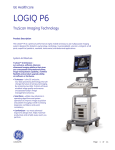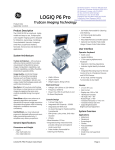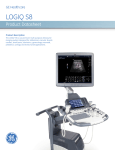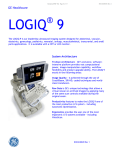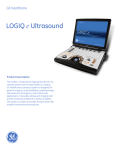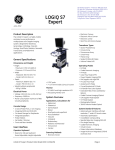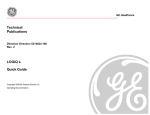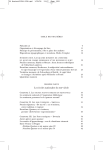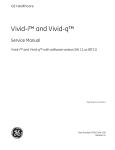Download LOGIQ P6 Premium
Transcript
GE Healthcare LOGIQ P6 Premium TruScan* Imaging Technology Product description The LOGIQ* P6 Premium is a high-end, highly mobile and intuitive, performance multipurpose color Doppler imaging system, designed for Abdominal, Obstetrics, Gynecology, Cardiology, Musculoskeletal, Vascular, Urological, Small Parts, Superficial, Pediatric, Neonatal, Transcranial, and other applications. General specifications System overview Dimensions and weight Applications Height Width Depth Weight Max.: 1525/1465 mm Min.: 1360/1300 mm 430 mm 640 mm Approx. 80 kg (176 lb) Electrical power Voltage Frequency Power Maximum Thermal Output 100-120 Vac or 220-240 Vac 50/60 Hz Max. 750 VA with built-in and on-board peripherals 2500 BTU/hr Console design 3 active probe ports Integrated HDD (Capacity: 250 GB) Integrated DVD-R/W Drive On-board storage for peripherals (Max 3 peripherals) Wheels •Wheel diameter: 12.5 cm •Integrated locking mechanism that provides rolling lock and optional caster swivel lock Probe holders, removable for cleaning and washing Gel holder, removable for cleaning and washing Air filters, easily removable Front handle User interface Operator keyboard Keyboard width: 43 cm Keyboard height: 84/90 cm 17 mm spacing alphanumeric keyboard Ergonomic hard key operations Indicator lights identify activated keys Integrated recording keys for remote control of up to 2 peripheral devices and DICOM® devices 8 TGC pods, with re-mapping functionality at any depth Monitor 17 inch TFT LCD XGA Format: •Display size: 1024 x 768 Tilt/rotate/translate •Tilt angle +40°– -90° •Rotate angle: ±90° •Translate horizontal ±442 mm •Translate vertical 165 mm Digital brightness/dim bright/contrast adjustment Abdominal Obstetrical Gynecological Cardiac Musculoskeletal Vascular Urological Small Parts and superficial Breast Pediatric and Neonatal Trancranial Endocavitary Intraoperative Transesophageal Scanning methods Electronic sector Electronic convex Electronic linear TEE multi plane sector array Real Time 4D Volume Sweep Transducer types Sector phased array Convex array Micro-convex array Linear array Single CW (pencil) probes TEE multi plane sector array probes Bi-plane Micro convex arrays Volume probes (4D) Operating modes B-Mode Coded Harmonic Imaging M-Mode Color Flow Mode (CFM) Power Doppler Imaging (PDI) with Directional Map PW Doppler with High PRF M-Color Flow Mode Anatomical M-Mode (option) Anatomical M-Color Mode (option) B-Flow* Mode (option) B-Flow Color Mode (option) Coded Contrast Imaging (option) CW Doppler Mode (option) PFD Mode (option) System overview (cont.) Operating modes (cont.) Tissue Velocity Imaging (TVI) Mode (option) 3D/4D Volume Modes (option) •3D Static (option) •4D Real time (option) •Elastography (option) System standard features Hard disk partition of 50 GB for image storage Without compression: •Raw DICOM: up to 33,000 images •DICOM image only: HDD up to 71,000 images CINE Memory, 256 MB Up to 60s Up to 1000 frames depending on depth, FOV, line density, etc. Real-time Triplex mode at any depth and PRF CrossXbeam SRI: Speckle Reduction Imaging Automatic Optimization ATO: Auto Tissue Optimization Auto TGC ASO: Auto Spectrum Optimization ACO: Auto Color Optimization Coded Harmonic Imaging Coded Excitation Virtual Convex Patient information database Image Archive on CD/DVD and hard drive Easy backup to media for data security TruAccess, Raw Data processing and analysis Real-time Automatic Doppler Calcs OB calcs Report designer Fetal trending Multi Gestational calcs Hip Dysplasia calcs Gynecological calcs Vascular calcs Cardiac calcs Urological calcs Renal calcs InSite* capability, remote service iLinq capability, remote service On-board electronic documentation (XPS format) MPEGVue Key macro Network storage Quick save System options Auto IMT Elastography Easy 3D (baby face, vascular) Advanced 3D, with 3D landscape DICOM 3.0 connectivity LOGIQ View B-Flow color Hybrid Contrast Imaging Anatomical M-Mode Real Time 4D ECG ECG Cable Steered CWD Rear handle Drawer Probe cable hanger Urology probe holder Stress Echo package PFD (Pulsatile Flow Detection) Tissue Velocity Imaging (TVI), with Q-Analysis 1-pedal and 3-Pedal Foot Switch, with programmable functionality Remote control switch On-board electronic documentation (PDF format) Media & peripheral options Integrated mounting kits and remote controls provided for •B/W digital thermal printer •Digital Color A6 Digital thermal printer •Digital Color A5 Digital thermal printer •DVD video recorder Display modes Live and stored display format: Full size and split screen – both w/ thumbnails. For Still and CINE Review image format: 4x4, and “thumbnails”. For Still and CINE Simultaneous capability •B/PW •B/CFM or PDI •B/M •B+CFM/M •Real-time Triplex Mod (B + CFM or PDI/PW) •B-Flow + PW (option) •Dual B (B/B) •Dual B + CFM or PDI •B/PFD (option) System overview (cont.) Display modes (cont.) Selectable alternating modes •B/M •B/PW •B + CFM/M •B + CFM (PDI)/PW •B-Flow + PW (option) •3D – Mode •3D – Color Mode (option) •B/CW (option) •B + CFM (PDI)/CW (option) •B + PFD/PW (option) Simultaneous Display with Bi-plane probe •B/CFM Multi Image split screen •Live and/or frozen •B + B/CFM or PDI •B+B/PFD (option) •Independent CINE playback •Quad screen format Zoom: write/read/pan Colorized image •Colorized B •Colorized M •Colorized PW •Colorized CW (option) •Colorized B-Flow (option) Time line display •Independent Dual B/PW display •Display formats: Top/bottom selectable format (Size: 1/2:1/2; 1/3:2/3; 2/3:1/3) side/side selectable format (1/2:1/2; 1/3:2/3; 0:1) •Switchable after freeze Virtual Convex CrossXbeam Tissue Velocity Imaging (TVI) Mode Elastography and simultaneous B/Elasto Display annotation 1st Patient name: First, last, and middle name each store 27 characters. Up to 64 total characters displayed Patient ID: 31 characters. Up to 27 total characters displayed 2nd Patient ID Age, sex and birth date (optional) Hospital name: 23 characters Date: 3 types selectable (MM/DD/YY, DD/MM/YY, YY/MM/DD) Time: 2 types selectable •24 hours •12 hours Gestational age from LMP/EDD/GA/BBT Probe name Gray Map names Probe orientation Depth scale marker Lateral scale marker Focal Zone markers Image depth Zoom depth B-Mode •Gain •Dynamic range •Imaging frequency •Edge enhance •Frame averaging •Gray Map •ATO On/off M-Mode •Gain •Dynamic Range •Time Scale Doppler Mode •Gain •Angle •Sample volume depth and width •Wall filter •Velocity and/or frequency scale •Spectrum inversion •Time scale •PRF •Doppler frequency Color Flow Mode •Line density •Frame averaging •Packet size •Color scale •Color velocity range and baseline •Color threshold marker •Color gain •PDI •Color scale inversion •Color doppler frequency TGC Curve Acoustic frame rate Cine frame number VCR counter VCR status VCR playback counter Body pattern Application name Measurement results Operator message Displayed acoustic output •TIS: Thermal Index Soft Tissue •TIC: Thermal Index Cranial (Bone) •TIB: Thermal Index Bone •MI: Mechanical Index % of Power output Biopsy guide line and/or zone Heart rate General system parameters System setup 8 Pre-programmable Categories User Programmable Preset Capability Factory default preset data Languages: English, French, German, Spanish, Italian, Portuguese, Russian, Greek, Swedish, Danish, Dutch, Finnish, Norwegian, Japanese OB Report format: 5 Types, Tokyo Univ., Osaka Univ., USA, Europe, and ASUM EFBW: 10 types, Japan, USA and Europe (Tokyo Univ., Osaka Univ., Tokyo Shinozuka, JSUM, German, Shephard, Merz, Hadlock/Shephard, Williams, Brenner) 348 Pre-defined annotations and user programmable libraries/annotations Body patterns: 140 human types plus 14 animal types Customized comment home position Complete User Manual available on board through Help (F1) User Manual and Service Manual are included on CD with each system. A printed Manual is available upon request. CINE memory/image memory CINE memory: 256 MB Dual Image CINE display Quad Image CINE display CINE Gauge and CINE Image Number display CINE Review Loop CINE Review Speed: 20 steps (10, 20, 30, 40, 50, 60, 70, 80, 90, 100, 150, 200, 300, 400, 500, 600, 700, 800, 900, 1000%) Selectable CINE Sequence for CINE Review Measurements, calculations and annotations on CINE Playback Scrolling timeline memory Cine Capture Function Digital Continuous CINE Capture Image storage On-board database of patient information from past exams Storage Format: DICOM/Raw Data DICOM Still Image storage size: •Gray image: ~300K to ~1.3 MB •Color image: ~900K to 1.9 MB Multiframe Display Format: Full size, 4x4, and “thumbnails” Live image and stored image side-by-side display CD-R storage: 650, 700 MB DVD storage: -R (4.7 GB) Conversion to JPEG, AVI (SaveAs) and WMV (MPEGvue) file formats Internal Hard Drive partition of 50 GB for image storage External USB 2.0 hard drive support for import, export, DICOM Read, SaveAs and MPEGVue USB 1.1/2.0 Memory Stick support for SaveAs and MPEGVue Network Storage support for import, export, DICOM Read, SaveAs, MPEGVue Connectivity Ethernet network connection RS-232 serial data output (need a converter cable) DICOM 3.0 (option) •Verify •Print •Store •Modality worklist •Storage commitment •Modality Performed Procedure Step (MPPS) •Media exchange •Off network/mobile storage queue •Query/retrieve; supported on Centricity and other compatible vendors •Structured reporting; compatible with LOGIQworks •Public SR Template •Media Store of SR •iLinq capability Scanning parameters Digital Beam former 75.189 effective system processing channels Maximum frame rate: 1652 F/s Displayed Imaging Depth: 0 – 30 cm Minimum Depth of Field: 0 – 2 cm (probe dependent) Maximum Depth of Field: 0 – 30 cm (probe dependent) Transmission focus •1 – 8 Focus points selectable (probe and application dependent) Continuous Dynamic Receive, Focus/Aperture Multi-Frequency/Wideband Technology Frequency Range 1 to 15 MHz 256 Shades of Gray Up to 259 dB composite Dynamic Range 16,777,216 Hues of Color Adjustable Field of View (FOV) up to 170º depending on probe Image reverse: Right/left Image rotation: 4 steps rotation: 0°, 90°, 180°, 270° B-Mode B/M Acoustic output: 0 – 100%, 2% step Image reverse: On/off B Color: 10 types Thermal Index: TIC, TIS, TIB Softener: 4 steps Focus number: 8 steps Focus width: 3 types Range focus: On/off General system parameters (cont.) B-Mode (cont.) Compression: 0.5 – 1.5, 0.1 step Line Density: 4 steps Line Density Zoom: 4 steps Suppression: 6 steps Frame average: 8 steps Edge enhance: 6 steps Scanning Size (FOV or Angle): probe dependent, see probe specifications Gray Scale Map: 23 types Clear Map: 23 types Tint Map: 10 types Gain: 0 – 98 dB, 2 dB step Dynamic Range: 30 – 120 dB, 3 dB step Depth: 1 – 30 cm, 1 cm step, depend on probe Rejection: 6 steps Frequency: Up to 5 steps, depend on probe Auto Line Density: On/off pre-settable Diff: On/off Steered Linear: ±15° Color flow mode Base Line: 0 – 100 %, 10 % step Invert: On/off CF/PDI Focus Depth: default pre-settable for 0 – 100 % of ROI in depth, 10 % step CF/PDI Flash Suppression: 2 steps CF/PDI Acoustic Output: 0 – 100%, 10% step CF/PDI Angle Steer: 0, ±20° Packet Size: 5 – 16, dependent on probe/application Line Density: 5 steps Line Density Zoom: 5 steps Frame Average: 7 steps PRF: 280 Hz – 19600 Hz Spatial filter: 6 steps Gain: 0 – 40 dB, 0.5 dB step Wall filter: 4 steps depend on probe/application Scanning size (FOV or Angle): Probe dependent CF/PDI Vertical Size (mm) of ROI: Default pre-settable CF/PDI Center Depth (mm) of ROI: Default pre-settable CF/PDI Frequency: Up to 3 steps, depend on probe Color Map: 20 types depend on application Transparent: 5 steps Color Threshold: 0 – 100%, 5% step Arbitration Threshold: 15 steps pre-settable Auto Line Density: On/off pre-settable PW/CF Ratio: 1, 2, 4 Accumulation: 8 steps Power doppler imaging PDI Map: 13 types CF/PDI Flash Suppression: 2 steps CF/PDI Focus Depth: default pre-settable for 0 – 100% of ROI in depth, 10% step CF/PDI Acoustic Output: 0 – 100%, 10% step CF/PDI Angle Steer: 0, ±20° Packet size: 5 – 16, dependent on probe/application Spatial Filter: 6 steps Frame Average: 7 steps PRF: 280 Hz – 19,600 Hz Power Threshold: 0 – 100%, 5% step Gain: 0 – 40 dB, 0.5 dB step Wall Filter: 7 steps depend on probe/application CF/PDI Frequency: Up to 3 steps, depend on probe Auto Line Density: On/off pre-settable Transparent: 5 steps Invert: On/off Accumulation: 8 steps M-Mode Sweep speed: 8 steps M Color: 10 types M/PW Display format: V-1/3B, V-1/2B, V-2/3B, H-1/2B, H-1/4B, TL only B/M Acoustic Output: 0 – 100%, 2% step Rejection: 6 steps Dynamic Range: 30 – 120 dB, 3 dB step Edge Enhance: 6 steps Gray Scale Map: 23 types Clear Map: 23 types M Gain: 0 – 98 dB, 2 dB step Anatomical M-Mode M-Mode cursor adjustable at any plane Can be activated from a CINE loop from a live or stored image Available with Color Flow Mode M & A capability PW/CW-Mode Maximum and Minimum Velocity Scales •Max: 10 m/sec •Min: 5 cm/sec Gray Scale Map: 4 types Dynamic Range: 24 – 60, 4 dB step Base Line: 5 – 95%, 11 steps SV Gate: 1, 2, 3, 4, 5, 6, 7, 8, 9, 10, 12, 14, 16 mm Angle Correct: ±90°, 1° step Spectral Color: 6 types General system parameters (cont.) PW/CW-Mode (cont.) PW Sweep Speed: 8 steps Invert: On/off M/PW Display Format: V-1/3B, V-1/2B, V-2/3B, H-1/2B, H-1/4B, TL only Duplex: On/off (PW only) PW Acoustic Output: 0 – 100 %, 10 % step Spectral Averaging: 4 steps Time Resolution: 4 steps PW/CF Ratio: 1, 2, 4 Rejection: 15 steps Gain: 0 – 32 dB, 1 dB step Wall Filter: 5 – 1500 Hz, 22 steps, depend on probe/application PW Angle Steer: 0, ±5, 10, 15, 20° PRF: 640 – 29800 Hz with PW, 50000 Hz with CW Sample Volume Depth: 29 steps default pre-settable CW-Mode (option) is available on the following probes • 3S • 6Tc • 3Sp • P2D • 5Sp • P6D Coded harmonic imaging Available on the following probes • 3CRF • 8L • 4C • 9L • 5CS • 11L • E8C • ML6-15 • E8CS • i739 • 8C • T739 • ERB • 6Tc • BE9CS • 4D3C-L • 3S • 4D5C-L • 3Sp • 4DE7C • 5Sp • 4D8C Softener: 4 steps Line Density: 4 steps Line Density Zoom: 4 steps Suppression: 6 steps Edge Enhance: 6 steps Gray Scale Map: 23 types Clear Map: 23 types Tint Map: 10 types Gain: 0 – 98 dB, 2 dB step Dynamic Range: 30 – 120 dB, 3 dB step Rejection: 6 steps Auto Line Density: On/off pre-settable Frequency: Up to 5 steps, depend on probe Coded excitation Available on the following probes • 11L • E8CS • 8C • BE9CS • E8C• ERB Virtual convex Provides a Convex Field of View for Convex, Linear and Sector probes Available on the following probes •8L • ERB – Linear • 9L • 4C • 11L • 5CS •ML6-15 •4D3C-L • T739 • 4D5C-L • I739 • 3CRF • 3S • 8C • 3Sp • E8C • 5Sp • 4D8C • 6Tc Automatic optimization Optimize B-Mode, B-Flow image to improve contrast resolution Selectable amount of contrast resolution improvement (low, medium, high) Auto-TGC in B-Mode and Color – adjusts overall and axial gain Optimize Spectral Waveform -adjusts baseline, invert, PRF (on live image), and angle correction Algorithm works on focal zone/ number and depth changes Available on stored or live image Available in B-Mode, B-Flow, PW Doppler, and Color Doppler B-Flow color (option) Available on 8L, 9L, 11L, ML 6-15, i739, T739, 4C, 5CS and 4D3C-L, 4D5C- L Probes Background: On/off Sensitivity/PRI: 14 steps Line Density: 4 steps Edge Enhance: 6 steps Frame Average: 8 steps Gray Scale Map: 23 types Clear Map: 23 types Tint Map: 10 types Dynamic Range: 30 – 120 dB, 3 dB step Rejection: 6 steps Gain: 0 – 98 dB, 2 dB step Auto Line Density: On/off pre-settable Dual Beam: On/off pre-settable B-Flow Color: 8 color maps and 3 directional color maps Accumulation: 8 steps General system parameters (cont.) Elastography mode (option) Elasto Acoustic Output: 0 – 100% Line Density Elasto Frequency Frame Average Axial Smoothing Later Smoothing Window Frame Reject Noise Reject Transparency Map Color and Gray Map Soft Compress Hard Compress Quality Graph : On/off Available on the following probes •11L •ML6-15 Auto IMT (option) Automated measurement of the intimae media thickness of common carotid artery Result window displayed on screen Hybrid contrast imaging (option) Coded Harmonic Angio: Available on 4C, 5CS, i739 and t739 probes •Tissue Background Selection: 4 steps TruAgent Detection: Available on 4C and 5CS probes •2 frequencies on 4C and 5CS probes •Monitor Mode Coded Phase Inversion •3 types, Available on 4C and 5CS probes •1 type, Available on i739, t739 probes •Tissue Background Selection: 4 steps Visulaization Contrast Imaging •Available on 4C, 5CS, i739 and t739 probes •Display Tissue image and Contrast Enhanced image simultaneously in split screen Max Enhancement: On/off Gray Scale Map: 21 types Clear Map: 21 types Contrast Clock Display Colorization: On/off Time Trigger Scan: 0.3, & 0.5 – 10 sec, 0.5 sec step Time Intensity Curve Analysis Accumulation: 8 steps SRI-HD The LOGIQ P6 is designed for compatibility with commercially available ultrasound contrast agents. Because the availability of these agents is subject to government regulation and approval, product features intended for use with these agents may not be commercially marketed nor made available before the contrast agent is cleared for use. Contrast related product features are enabled only on systems for delivery to an authorized country or region of use. GE Medical Systems makes no claims concerning the safety or effectiveness of contrast agents.1 LOGIQ view (option) Available on all probes Extended Field of View imaging For use in B-Mode LOGIQ View Status Auto detection of scan direction Pre or post-process zoom up to 10X Rotation Auto best fit on monitor Measurements in B-Mode Up to 60 cm scan length Easy 3D (option) Colorize Threshold (Opacification) Render Texture Gray Surface Scalpel Auto Movie Undo Reset Advanced 3D (option) Acquisition of Color data Automatic rendering 3D Landscape technology 3D Movie Main Mode CrossXBeam Provides Spatial Compounding Available on the linear and convex probes • 3CRF • ML6-15 • 4C • T739 • 5CS • BE9C • 8C • BE9CS • E8C • 4D3C-L • E8CS • 4DE7C • 8L • 4D8C • 9L • ERB • 11L General System Parameters (cont.) CrossXBeam Provides 3, 5 or 7 angles for Compounding on Linear probes, 3 or 5 angles on Convex probes Compatible with side-by-side display Compatible with: Color mode, Timeline mode, SRI-HD, Coded Harmonic Imaging, Virtual Convex on linear probes Stress echo package (option) Advanced and flexible stress-echo examination capabilities Provides exercise and pharmacological protocol templates •6 default templates Template editor for user configuration of existing templates or creation of new templates Reference scan display during acquisition for stress level comparison (dual screen) •Baseline level/Previous level selectable Raw Data continuous capture •Over 180 sec available Wall motion scoring (bulls-eye and segmental) PFD (option) Available on all probes PFD Map: 4 types •PFD directional/pulsatile: 2 types •PFD pulsatile/non pulsatile: 2 types PFD Type: 6 steps PFD Scale: 1-109, 3 step CF/PDI/PFD Flash Suppression: 2 steps CF/PDI/PFD Focus Depth: default pre-settable for 0 – 100% of ROI in depth, 10% step CF/PDI/PFD Acoustic Output: 0 – 100%, 10% step CF/PDI/PFD Angle Steer: 0, ±20° Packet Size: 5 – 16, dependent on probe/application Spatial Filter: 6 steps Frame Average: 7 steps PRF: 280 Hz – 19600 Hz Power Threshold: 0 – 100%, 5% step Arbitration Threshold: 15 steps pre-settable Gain: 0 – 40 dB, 0.5 dB step Wall Filter: 4 steps CF/PDI/PFD Frequency: Up to 3 steps, depend on probe Auto Line Density: On/off pre-settable Transparent: 5 steps Invert: On/off Accumulation: 8 steps SRI-HD High Definition Speckle Reduction Imaging (SRI-HD) Provides 6 levels of speckle reduction Side-by-side display Available on all probes Compatible with ALL scanning modes Compatible with side-by-side display Pre and post processing TVI (option) Myocardial Doppler Imaging with color overlay on tissue image Available on all sector probes Tissue color overlay can be removed to show just the 2D image, still retaining the tissue velocity information Anatomical M-Mode: free placement of M-Mode generated from the cursor independent from the axial plane Q-Analysis: Multiple Time – Motion trace display from selected points in the myocardium Real time 4D (option) Acquisition Modes: •Real-time 4D B-Mode •Static 3D B-Mode Max Volumes: 43.8 Hz Visualization Modes: •3D Rendering (diverse surface and intensity projection modes) •Sectional Planes (3 Section planes perpendicular to each other) Render Mode: •Surface texture, Surface Smooth, max-, min- and X-ray (average intensity projection), Gradient, Inversion, Glass Body, Mix Mode of two render Modes Curved 3point Render start 3D Movie Scalpel: 3D Cut tool Display Format: • Quad: A-/B-/C-Plane/3D • Dual: A-Plane/3D •Single: 3D or A- or B- or C-Plane Pre-Processing Acoustic power output Write Zoom up to 8x B/M-Mode •Gain •TGC •Image Reverse Depth •Scan Area Auto •Optimize (ATO) •Dynamic Range Focus •Number Focus •Position Line Density •Frequency Image • Rotation Gray Map • Colorize Frame • Average Edge Enhance • Rejection Virtual • Convex Focus Width • Suppression B • Softener M/D Cursor • Sweep Speed for M-Mode General System Parameters (cont.) Pre-Processing (cont.) PW-Mode •Gain • Rejection Time •Sample Volume Depth • Resolution •PRF • Gray Map •Wall Filter • Colorize •Baseline • Duplex Auto Calcs •Angle Steer • Trace Direction •Angle Correct • Modify Calcs •Quick Angle Correct • Number of Average Cycles •Auto Angle Correct • Trace Method •Doppler Frequency • Trace Sensitivity •Doppler Invert • Auto Optimize (ASO) •Display Format Sweep Speed • Audio Volume •Full Timeline Color Flow Mode (optional) •Gain • Color Invert •ROI Position, Size • Color Map •PRF • Threshold Frame •Wall Filter • Average Focus •Baseline • Position •Angle Steer • ACE •Color • Spatial Filter •Line • CFM/PWD Ratio •Density Color • Duplex •Frequency • Sweep Speed for Color M-Mode •Packet Size • Anatomical Color M-Mode 3D Acquisition •Scan Distance • Front to back, side to side •ROI Style • Acquisition Mode •Display Format • Parallel Sweep •Scan Plane Post-Processing w/TruAccess (Raw Data) SRI – 5 Selectable level Read Zoom up to 8x B/M-Mode •Gain •Dynamic Range •TGC •Image Reverse •Auto Tissue Optimize (ATO) •Compression •Image Rotation •Gray Map •Colorize •Frame Average (in loop images) • Rejection •Sweep Speed for M-Mode •Anatomical M-Mode PW/CW-Mode •Post Gain • Full Timeline •Baseline Angle • Rejection •Correct Quick Angle • Map Gray •Correct Doppler Invert • Colorize •Display Format Sweep • Compression (Dynamic Range) •Speed • Auto Optimize (ASO) Color Flow Mode •Auto Color Optimization (ACO) •Baseline •Color Invert •Color Map •Threshold •Frame Average (in loop images) •Sweep Speed for Color M-Mode •Anatomical Color M-Mode Easy 3D (option) •Colorize • Gray Surface •Threshold (Opacification) • Scalpel •Mix Type 1 • Auto Movie •Render •Undo •Texture •Reset Advanced 3D (option) •3D Landscape • Visible Data •Colorize •Tile •Threshold (Opacification) • Active Data Re-slice •Type 1/2 • Auto Movie •Group Planes • Rotate Undo •Scalpel Define Axis • Reset 3D Movie •Colorize • Define Start/End •Pause • Auto Movie •Movie Speed • 360° Manual •Axis Measurements/calculations 1. Abdomen and small parts measurements/calculations: •Aorta Diameter •Renal Length •Doppler Abdomen and Renal Artery Exam/Cals •Thyroid 2. Urology measurements/calculations: •Bladder •Prostate •Renal •Testicle •STVOL •Pelvic Floor Study 3. Pediatrics measurements/calculations: •Hip Dysplasia •Alpha HIP •d:D Ratio General B-Mode Depth & Distance Circumference (Ellipse/Trace) Area (Ellipse/Trace) Volume (Ellipsoid) % Stenosis (Area or Diameter) Angle between two lines Measurements/calculations (cont.) General M-Mode (cont.) M-Depth Distance Time Slope Heart Rate General Doppler measurements/calculations Velocity Time A/B Ratio (Velocities/Frequency Ratio) PS (Peak Systole) ED (End Diastole) PS/ED (PS/ED Ratio) ED/PS (ED/PS Ratio) AT (Acceleration Time) ACCEL (Acceleration) TAMAX (Time Averaged Maximum Velocity) Volume Flow (TAMEAN and Vessel Area) Heart Rate PI (Pulsatility Index) RI (Resistivity Index) Real-time Doppler auto measurements/calculations PS (Peak Systole) ED (End Diastole) MD (Minimum Diastole) PI (Pulsatility Index) RI (Resistivity Index) AT (Acceleration Time) ACC (Acceleration) PS/ED (PS/ED Ratio) ED/PS (ED/PS Ratio) HR (Heart Rate) TAMAX (Time Averaged Maximum Velocity) PVAL (Peak Velocity Value) Volume Flow (TAMEAN and Vessel Area) OB measurements/calculations Gestational Age by: •GS (Gestational Sac) •CRL (Crown Rump Length) •FL (Femur Length) •BPD (Biparietal Diameter) •AC (Abdominal Circumference) •HC (Head Circumference) •APTD x TTD (Anterior/Posterior Trunk Diameter by Transverse Trunk Diameter) •LV (Length of Vertebra) •FTA (Fetal Trunk Cross-sectional Area) •HL (Humerus Length) •BD (Binocular Distance) •FT (Foot Length) •OFD (Occipital Frontal Diameter) •TAD (Transverse Abdominal Diameter) •TCD (Transverse Cerebellum Diameter) •THD (Thorax Transverse Diameter) •TIB (Tibia Length) •ULNA (Ulna Length) Estimated Fetal Weight (EFW) by: • AC, BPD •AC, BPD, FL •AC, BPD, FL, HC • AC, FL •AC, FL, HC • AC, HC Calculations and Ratios • FL/BPD • FL/AC • FL/HC • HC/AC •CI (Cephalic Index) •AFI (Amniotic Fluid Index) Measurements/Calculations by: Jeanty, Merz, Tokyo University, Mercer, Hansmann, Erickson, Hill, Shephard, Hadlock, Hohler, Campbell Fetal Graphical Trending Growth Percentiles Multi-Gestational Calculations (4) Fetal Qualitative Description (Anatomical survey) Fetal Environmental Description (Biophysical profile) Programmable OB Tables Over 20 selectable OB Calcs Expanded Worksheets GYN measurements/calculations Right ovary length, width, height Left ovary length, width, height Uterus length, width, height Ovarian volume ENDO (Endometrial thickness) Ovarian RI Uterine RI Follicular measurements Summary reports Vascular measurements/calculations Carotid Artery Lower extremity artery Lower extremity vein Upper extremity artery Upper extremity vein Abdominal Renal Artery Measurements/calculations (cont.) Vascular measurements/calculations (cont.) TCD SYS DCCA (Systolic Distal Common Carotid Artery) DIAS DCCA (Diastolic Distal Common Carotid Artery) SYS MCCA (Systolic Mid Common Carotid Artery) DIAS MCCA (Diastolic Mid Common Carotid Artery) SYS PCCA (Systolic Proximal Common Carotid Artery) DIAS PCCA (Diastolic Proximal Common Carotid Artery) SYS DICA (Systolic Distal Internal Carotid Artery) DIAS DICA (Systolic Distal Internal Carotid Artery) SYS MICA (Systolic Mid Internal Carotid Artery) DIAS MICA (Diastolic Mid Internal Carotid Artery) SYS PICA (Systolic Proximal Internal Carotid Artery) DIAS PICA (Diastolic Proximal Internal Carotid Artery) SYS DECA (Systolic Distal External Carotid Artery) DIAS DECA (Diastolic Distal External Carotid Artery) SYS PECA (Systolic Proximal External Carotid Artery) DIAS PECA (Diastolic Proximal External Carotid Artery) VERT (Systolic Vertebral Velocity) SUBCLAV (Systolic Subclavian Velocity) Summary Reports Mean IMT Measurement Tools Cardiac measurements/calculations B-Mode measurements Aorta •Aortic Root Diameter (Ao Root Diam) •Aortic Arch Diameter (Ao Arch Diam) •Ascending Aortic Diameter (Ao Asc) •Descending Aortic Diameter (Ao Desc Diam) •Aorta Annulus Diameter (Ao Annulus Diam) •Aorta Isthmus (Ao Isthmus) •Aorta (Ao st junct) Aortic Valve •Aortic Valve Cusp Separation (AV Cusp) •Aortic Valve Area Planimetry (AVA Planimetry) • (Trans AVA) Left Atrium •Left Atrium Diameter (LA Diam) •LA Length (LA Major) •LA Width (LA Minor) •Left Atrium Diameter to AoRoot Diameter Ratio (LA/Ao Ratio) •Left Atrium Area (LAA(d), LAA(s)) •Left Atrium Volume, Single Plane, Method of Disk (LAEDV A2C, LAESV A2C) (LAEDV A4C, LAESV A4C) Left Ventricle •Left Ventricle Mass (LVPWd, LVPWs) •Left Ventricle Volume, Teichholz/Cubic (LVIDd, LVI Ds) •Left Ventricle Internal Diameter (LVIDd, LVI Ds) •Left Ventricle Length (LVLd, LVLs) •Left Ventricle Outflow Tract Diameter (LVOT Diam) •Left Ventricle Posterior Wall Thickness (LVPWd, LVPWs) •Left Ventricle Length (LV Major) •Left Ventricle Width (LV Minor) •Left Ventricle Outflow Tract Area (LVOT) •Left Ventricle Area, Two Chamber/Four Chamber/Short Axis (LVA (d), LVA (s)) •Left Ventricle Endocardial Area, Width (LVA (d), LVA(s)) •Left Ventricle Epicardial Area, Length (LVAepi (d), LVAepi (s)) •Left Ventricle Mass Index (LVPWd, LVPWs) •Ejection Fraction, Teichholz/Cube (LVIDd, LVIDs) •Left Ventricle Posterior Wall Fractional Shortening (LVPWd, LVPWs) •Left Ventricle Stroke Index, Teichholz/Cube (LVIDd, LVIDs, and Body Surface Area) •Left Ventricle Fractional Shortening (LVIDd, LVIDs) •Left Ventricle Stroke Volume, Teichholz/Cubic (LVIDd, LVIDs) •Left Ventricle Stroke Index, Single Plane, Two Chamber, Method of Disk (LVI Dd, LVIDs, LVSd, LVSs) •Left Ventricle Stroke Index, Single Plane, Four Chamber, Method of Disk (LVI Dd, LVIDs, LVSd, LVSs) •Left Ventricle Stroke Index, Bi-Plane, Bullet, Method of Disk (LVAd, LVAs) •Interventricular Septum (IVS) •Left Ventricle Internal Diameter (LVI D) •Left Ventricle Posterior Wall Thickness (LVPW) Mitral Valve •Mitral Valve Annulus Diameter (MV Ann Diam) •E-Point-to-Septum Separation (EPSS) •Mitral Valve Area by Pressure Half Time (MVA By PHT) •Mitral Valve Area Planimetry (MVA Planimetry) Pulmonic Valve •Pulmonic Valve Area (PV Planimetry) •Pulmonic Valve Annulus Diameter (PV Annulus Diam) •Pulmonic Diameter (Pulmonic Diam) Right Atrium •Right Atrium Diameter, Length (RAD Ma) •Right Atrium Diameter, Width (RAD Mi) •Right Atrium Area (RAA) •Right Atrium Volume, Single Plane, Method of Disk (RAAd) •Right Atrium Volume, Systolic, Single Plane, Method of Disk (RAAs) Right Ventricle •Right Ventricle Outflow Tract Area (RVOT Planimetry) •Left Pulmonary Artery Area (LPA Area) •Right Pulmonary Artery Area (RPA Area) •Right Ventricle Internal Diameter (RVIDd, RVIDs) •Right Ventricle Diameter, Length (RVD Ma) •Right Ventricle Diameter, Width (RVD Mi) •Right Ventricle Wall Thickness (RVAWd, RVAWs) •Right Ventricle Outflow Tract Diameter (RVOT Diam) •Left Pulmonary Artery (LPA) •Main Pulmonary Artery (MPA) •Right Pulmonary Artery (RPA) System •Interventricular Septum Thickness (IVSd, IVSs) •Inferior Vena Cava •Pulmonary Artery Diameter (MPA) •Systemic Vein Diameter (Systemic Diam) •Patent Ductus Arterosis Diameter (PDA Diam) Cardiac measurements/calculations (cont.) B-Mode measurements (cont.) •Pericard Effusion (PEs) •Patent Foramen Ovale Diameter (PFO Diam) •Ventricular Septal Defect Diameter (VSD Diam) •Interventricular Septum (IVS) •Fractional Shortening (IVSd, IVSs) Tricuspid Valve •Tricuspid Valve Area (TV Panimetry) •Tricuspid Valve Annulus Diameter (TV Annulus Diam) M-Mode measurements Aorta •Aortic Root Diameter (Ao Root Diam) Aortic Valve •Aortic Valve Diameter (AV Diam) •Aortic Valve Cusp Separation (AV Cusp) •Aortic Valve Ejection Time (LVET) Left Atrium •Left Atrium Diameter to AoRoot Diameter Ratio (LA/Ao Ratio) •Left Atrium Diameter (LA Diam) Left Ventricle •Left Ventricle Volume, Teichholz/Cubic (LVIDd, LVI Ds) •Left Ventricle Internal Diameter (LVIDd, LVI Ds) •Left Ventricle Posterior Wall Thickness (LVPWd, LVPWs) •Left Ventricle Ejection Time (LVET) •Left Ventricle Pre-Ejection Period (LVPEP) •Interventricular Septum (IVS) •Left Ventricle Internal Diameter (LVI D) •Left Ventricle Posterior Wall Thickness (LVPW) Mitral Valve •Mitral Valve E-Point-to-Septum Separation (EPSS) •Mitral Valve Leaflet Separation (D-E Excursion) •Mitral Valve Anterior Leaflet Excursion (D-E Excursion) •Mitral Valve D-E Slope (D-E Slope) •Mitral Valve E-F Slope (E-F Slope) Pulmonic Valve •QRS complex to end of envelope (Q-to-PV close) Right Ventricle •Right Ventricle Internal Diameter (RVIDd, RVIDs) •Right Ventricle Wall Thickness (RVAWd, RVAWs) •Right Ventricle Outflow Tract Diameter (RVOT Diam) •Right Ventricle Ejection Time (RVET) •Right Ventricle Pre-Ejection Period (RVPEP) •Velocity Circumferential Fiber Shortening (Vcf) System •Interventricular Septum Thickness (IVSd, IVSs) •Pericard Effusion (PE(d)) •Interventricular Septum (IVS) •Fractional Shortening (IVSd, IVSs) Tricuspid Valve •QRS complex to end of envelope (Q-to-TV close) Doppler Mode measurements Aortic Valve •Aortic Insufficiency Mean Pressure Gradient (AR Trace) •Aortic Insufficiency Peak Pressure Gradient (AR Vmax) •Aortic Insufficiency End Diastole Pressure Gradient (AR Trace) •Aortic Insufficiency Mean Velocity (AR Trace) •Aortic Insufficiency Mean Square Root Velocity (AR Trace) •Aortic Insufficiency Velocity Time Integral (AR Trace) •Aortic Valve Mean Velocity (AV Trace) •Aortic Valve Mean Square Root Velocity (AV Trace) •Aortic Valve Velocity Time Integral (AV Trace) •Aortic Valve Mean Pressure Gradient (AV Trace) •Aortic Valve Peak Pressure Gradient (AR Vmax) •Aortic Insufficiency Peak Velocity (AR Vmax) •Aortic Insufficiency End-Diastolic Velocity (AR Trace) •Aortic Valve Peak Velocity (AV Vmax) •Aortic Valve Peak Velocity at Point E (AV Vmax) •Aorta Proximal Coarctation (Coarc Pre-Duct) •Aorta Distal Coarctation (Coarc Post-Duct) •Aortic Valve Insufficiency Pressure Half Time (AR PHT) •Aortic Valve Flow Acceleration (AV Trace) •Aortic Valve Pressure Half Time (AV Trace) •Aortic Valve Acceleration Time (AV Acc Time) •Aortic Valve Deceleration TIme (AV Trace) •Aortic Valve Ejection Time (AVET) •Aortic Valve Acceleration to Ejection Time Ratio (AV Acc Time, AVET) •Aortic Valve Area according to PHT Left Ventricle •Left Ventricle Outflow Tract Peak Pressure Gradient (VLOT Vmax) •Left Ventricle Outflow Tract Peak Velocity (LVOT Vmax) •Left Ventricle Outflow Tract Mean Pressure Gradient (LVOT Trace) •Left Ventricle Outflow Tract Mean Velocity (LVOT Trace) •Left Ventricle Outflow Tract Mean Square Root Velocity (LVOT Trace) •Left Ventricle Outflow Tract Velocity Time Integral (LVOT Trace) •Left Ventricle Ejection Time (LVET) •Cardiac Output by Aortic Flow (AVA Planimetry, AV Trace) •Stroke Volume Index by Aortic Flow (AVA Planimetry, AV Trace) Mitral Valve •Mitral Valve Regurgitant Flow Acceleration (MR Trace) •Mitral Valve Regurgitant Mean Velocity (MR Trace) •Mitral Regurgitant Mean Square Root Velocity (MR Trace) •Mitral Regurgitant Mean Pressure Gradient (MR Trace) •Mitral Regurgitant Velocity Time Integral (MR Trace) •Mitral Valve Mean Velocity (MR Trace) •Mitral Valve Mean Square Root Velocity (MR Trace) •Mitral Valve Velocity Time Integral (MR Trace) •Mitral Valve Mean Pressure Gradient (MR Trace) •Mitral Regurgitant Peak Pressure Gradient (MR Vmax) •Mitral Valve Peak Pressure Gradient (MR Vmax) •Mitral Regurgitant Peak Velocity (MR Vmax) •Mitral Valve Peak Velocity (MR Vmax) •Mitral Valve Velocity Peak A (MV A Velocity) •Mitral Valve Velocity Peak E (MV E Velocity) •Mitral Valve Area according to PHT (MV PHT) Cardiac measurements/calculations (cont.) Doppler Mode measurements (cont.) •Mitral Valve Flow Deceleration (MV Trace) •Mitral Valve Pressure Half Time (PV PHT) •Mitral Valve Flow Acceleration (MV Trace) •Mitral Valve E-Peak to A-Peak Ratio (A-C and D-E) (MV E/A Ratio) •Mitral Valve Acceleration Time (MV Acc Time) •Mitral Valve Deceleration Time (MV Dec Time) •Mitral Valve Ejection Time (MV Trace) •Mitral Valve A-Wave Duration (MV A Dur) •Mitral Valve Time to Peak (MV Trace) •Mitral Valve Acceleration Time/Deceleration Time Ratio (MVAcc/Dec Time) •Stroke Volume Index by Mitral Flow (MVA Planimetry, MVTrace) •Mitral Valve Area from Continuity Equation (MVAPlanimetry, LVOT Vmax, MV Vmax) Pulmonic Valve •Pulmonic Insufficiency Peak Pressure Gradient (PR Vmax) •Pulmonic Insufficiency End-Diastolic Pressure Gradient (PRTrace) •Pulmonic Valve Peak Pressure Gradient (PV Vmax) •Pulmonic End-Diastolic Pressure Gradient (PR Trace) •Pulmonic Insufficiency Peak Velocity (PR Vmax) •Pulmonic Insufficiency End-Diastolic Velocity (Prend Vmax) •Pulmonic Valve Peak Velocity (PV Vmax) •Pulmonic End-Diastolic Velocity (PV Trace) •Pulmonary Artery Diastolic Pressure (PV Trace) •Pulmonic Insufficiency Mean Pressure Gradient (PR Trace) •Pulmonic Valve Mean Pressure Gradient (PV Trace) •Pulmonic Insufficiency Mean Velocity (PR Trace) •Pulmonic Insufficiency Mean Square Root Velocity (PR Trace) •Pulmonic Insufficiency Velocity Time Integral (PR Trace) •Pulmonic Valve Mean Velocity (PV Trace) •Pulmonic Valve Mean Square Root Velocity (PV Trace) •Pulmonic Valve Velocity Time Integral (PV Trace) •Pulmonic Insufficiency Pressure Half Time (PR PHT) •Pulmonic Valve Flow Acceleration (PV Acc Time) •Pulmonic Valve Acceleration Time (PV Acc Time) •Pulmonic Valve Ejection Time (PVET) •Pulmonic Valve Pre-Ejection Period (PVPEP) •QRS complex to end of envelope (Q-to-PV close) •Pulmonic Valve Acceleration to Ejection TIme Ratio (PV Acc Time, PVET) •Pulmonic Valve Pre-Ejection to Ejection Time Ratio (PVPEP, PVET) Right Ventricle •Right Ventricle Outflow Tract Peak Pressure Gradient (RVOT Vmax) •Right Ventricle Systolic Pressure (RVOT Vmax) •Right Ventricle Outflow Tract Peak Velocity (RVOT Vmax) •Right Ventricle Diastolic Pressure (RVOT Trace) •Right Ventricle Outflow Tract Velocity Time Integral (RVOTTrace) •Right Ventricle Ejection Time (RV Trace) •Stroke Volume by Pulmonic Flow (RVOTPlanimetry, RVOTTrace) •Right Ventricle Stroke Volume Index by Pulmonic Flow (RVOT Planimetry, RVOT Trace) System •Pulmonary Artery Peak Velocity (PV Vmax) •Pulmonary Vein Velocity Peak A (reverse) (P Vein A) •Pulmonary Vein Peak Velocity (P Vein D, P Vein S) •Systemic Vein Peak Velocity (PDA Diastolic, PDA Systolic) •Ventricular Septal Defect Peak Velocity (VSD Vmax) •Atrial Septal Defect (ASD Diastolic, ASD Systolic) •Pulmonary Artery Velocity Time Integral (PV Trace) •Systemic Vein Velocity Time Integral (PDA Trace) •Pulmonary Vein A-Wave Duration (P Vein A Dur) •IsoVolumetric Relaxation Time (IVRT) •IsoVolumetric Contraction Time (IVCT) •Pulmonary Vein S/D Ratio (P Vein D, P Vein S) •Ventricular Septal Defect Peak Pressure Gradient (VSD Vmax) •Pulmonic-to-Systemic Flow Ratio (Qp/Qs) Tricuspid Valve •Tricuspid Regurgitant Peak Pressure Gradient (TR Vmax) •Tricuspid Valve Peak Pressure Gradient (TV Vmax) •Tricuspid Regurgitant Peak Velocity (TR Vmax) •Tricuspid Valve Peak Velocity (TV Vmax) •Tricuspid Valve Velocity Peak A (TV A Velocity) •Tricuspid Valve Velocity Peak E (TV E Velocity) •Tricuspid Regurgitant Mean Pressure Gradient (TR Trace) •Tricuspid Valve Mean Pressure Gradient (TV Trace) •Tricuspid Regurgitant Mean Velocity (TR Trace) •Tricuspid Regurgitant Mean Square Root Velocity (TR Trace) •Tricuspid Regurgitant Velocity Time Integral (TR Trace) •Tricuspid Valve Mean Velocity (TV Trace) •Tricuspid Valve Mean Square Root Velocity (TV Trace) •Tricuspid Valve Velocity Time Integral (TV Trace) •Tricuspid Valve Time to Peak (TV Acc/Dec Time) •Tricuspid Valve Ejection Time (TV Acc/Dec Time) •Tricuspid Valve A-Wave Duration (TV A Dur) •QRS complex to end of envelope (Q-to-TV close) •Tricuspid Valve Pressure Half Time (TV PHT) •Stroke Volume by Tricuspid Flow (TV Planimetry, TV Trace) •Tricuspid Valve E-Peak to A-Peak Ratio (TV E/A Velocity) Color Flow Mode measurements Aortic Valve •Proximal Isovelocity Surface Area: Regurgitant Orifice Area (AR Radius) •Proximal Isovelocity Surface Area: Radius of Aliased Point (AR Radius) •Proximal Isovelocity Surface Area: Regurgitant Flow (AR Trace) •Proximal Isovelocity Surface Area: Regurgitant Volume Flow (AR Trace) •Proximal Isovelocity Surface Area: Aliased Velocity (AR Vmax) Mitral Valve •Proximal Isovelocity Surface Area: Regurgitant Orifice Area (MR Radius) •Proximal Isovelocity Surface Area: Radius of Aliased Point (MR Radius) •Proximal Isovelocity Surface Area: Regurgitant Flow (MR Trace) •Proximal Isovelocity Surface Area: Regurgitant Volume Flow (MR Trace) •Proximal Isovelocity Surface Area: Aliased Velocity (MR Vmax) Cardiac measurements/calculations (cont.) Probes Combination Mode measurements Aortic Valve •Aortic Valve Area (Ao Root Diam, LVOT Vmax, AV Vmax) •Aortic Valve Area by Continuity Equation by Peak Velocity (Ao Root Diam, LVOT Vmax, AV Vmax) •Stroke Volume by Aortic Flow (AVA Planimetry, AV Trace) •Cardiac Output by Aortic Flow (AVA Planimetry, AV Trace, HR) •Aortic Valve Area by Continuity Equation VTI (Ao Root Diam, LVOT Vmax, AV Trace) Left Ventricle •Cardiac Output, Teichholz/Cubic (LVIDd, LVIDs, HR) •Cardiac Output Two Chamber, Single Plane, Area-Length/ Method of Disk(Simpson) (LVAd, LVAs, HR) •Cardiac Output Four Chamber, Single Plane, Area-Length/ Method of Disk (Simpson) (LVAd, LVAs, HR) •Ejection Fraction Two Chamber, Single Plane, Area-Length/ Method of Disk (Simpson) (LVAd, LVAs) •Ejection Fraction Four Chamber, Single Plane, Area-Length/ Method of Disk (Simpson) (LVAd, LVAs) •Left Ventricle Stroke Volume, Single Plane, Two Chamber/Four Chamber,Area-Length (LVAd, LVAs) •Left Ventricle Stroke Volume, Single Plane, Two Chamber/Four Chamber, Method of Disk (Simpson) (LVIDd, LVIDs, LVAd, LVAs) •Left Ventricle Volume, Two Chamber/Four Chamber, Area-Length (LVAd, LVAs) •Ejection Fraction, Bi-Plane, Method of Disk (LVAd, LVAs, 2CH, 4CH) •Left Ventricle Stroke Volume, Bi-Plane, Method of Disk (LVAd, LVAs, 2CH, 4CH) •Left Ventricle Volume, Bi-Plane, Method of Disk (LVAd, LVAs, 2CH, 4CH) •Left Ventricle Stroke Index, Single Plane, Two Chamber/Four Chamber, Area-Length (LVSd, LVSs, and BSA) •Left Ventricle Volume, Single Plane, Two Chamber/Four Chamber, Method of Disk (LVAd, LVAs) •Left Ventricle Volume, Apical View, Long Axis, Method of Disk (LVAd, LVAs) •Stroke Volume by Aortic Flow (AVA Planimetry, AV Trace) Mitral Valve •Stroke Volume by Mitral Flow (MVA Planimetry, MV Trace) •Cardiac Output by Mitral Flow (MVA Planimetry, MV Trace, HR) Pulmonic Valve •Stroke Volume by Pulmonic Flow (PV Planimetry, PV Trace) •Cardiac Output by Pulmonic Flow (PV Planimetry, PV Trace, HR) Tricuspid Valve •Cardiac Output by Tricuspid Flow (TV Planimetry, TV Trace, HR) 3CRF Wide Band Micro-convex Probe Applications Abdomen, Urology, Vascular Probe Band Width 2.0 – 4.0 MHz Number of Element 128 Convex Radius 20 mmR FOV (Max) 80° Physical Foot Print 28 x 15 mm B-Mode Imaging Frequency 2.0, 3.0, 3.5, 4.0 MHz Harmonic Frequency 3.6, 3.8, 4.0, 4.2 MHz Doppler Frequency 2.5, 3.3 MHz Biopsy Guide Available Single-angle, Reusable Report Writer On-board reporting package automates report writing Formats various exam results into a report suitable for printing to a windows printer or reviewing on a standard PC Exam results include patient info, exam info, measurements, calculations, images, comments and diagnosis Standard templates provided Customizable templates 4C Wide Band Convex Probe Applications Probe Band Width Number of Element Convex Radius FOV (Max) Physical Foot Print B-Mode Imaging Frequency Harmonic Frequency Doppler Frequency Biopsy Guide Available Abdomen, OB/GYN, Urology, Vascular 1.4 – 5 MHz 128 60 mmR 58° 60 x 18 mm 2.0, 3.0, 4.0, 5.0 MHz 4.0, 5.0, 5.2, 5.5 MHz 2.5, 3.3 MHz Multi-angle, Reusable 5CS Convex Probe Applications Probe Band Width Number of Element Convex Radius FOV (Max) Physical Foot Print B-Mode Imaging Frequency Harmonic Frequency Doppler Frequency Biopsy Guide Available Abdomen, OB/GYN, Urology 2 – 6 MHz 128 60 mmR 58° 60 x 18 mm 2.0, 3.0, 4.0, 5.0 MHz 4.0, 5.0, 5.2, 6.0 MHz 2.5, 3.3 MHz Multi-angle, Reusable Probes (cont.) E8C Wide Band Micro-convex Probe Applications Probe Band Width Number of Element Convex Radius FOV (Max) Physical Foot Print B-Mode Imaging Frequency Harmonic Frequency Doppler Frequency Biopsy Guide Available OB/GYN, Urology, Endocavity 4 – 11 MHz 128 11 mmR 133° 26 x 10 mm 6.0, 8.0, 10.0 MHz 8.0, 10.0 MHz 4.0, 5.0 MHz Single-angle, Disposable and Reusable E8CS Wide Band Micro-convex Probe Applications Probe Band Width Number of Element Convex Radius FOV (Max) Physical Foot Print B-Mode Imaging Frequency Harmonic Frequency Doppler Frequency Biopsy Guide Available OB/GYN, Urology, Endocavity 4 – 11 MHz 128 9 mmR 168° 15 x 10 mm 6.0, 8.0, 10.0 MHz 8.0, 10.0 MHz 4.0, 5.0 MHz Single-angle, Disposable and Reusable 8C Wide Band Micro-convex Probe Applications Probe Band Width Number of Element Convex Radius FOV (Max) Physical Foot Print B-Mode Imaging Frequency Harmonic Frequency Doppler Frequency Biopsy Guide Available Neonatal, Pediatrics 4 – 11 MHz 128 11 mmR 133° 26 x 10 mm 6.0, 8.0, 10.0 MHz 8.0, 10.0 MHz 4.0, 5.0 MHz None 3S Wide Band Phased Array Sector Probe Applications Cardiac, Trancranial, Abdomen Probe Band Width 1.5 – 3.5 MHz Number of Element 64 FOV (Max) 90° Physical Foot Print 19 x 12 mm B-Mode Imaging Frequency 2.0, 2.5, 3.0 MHz Harmonic Frequency 2.8, 3.0, 3.2, 3.6 MHz Doppler Frequency 1.7, 2.0, 2.2 MHz CW Doppler Frequency 2.0 MHz Biopsy Guide Available Multi-angle, Reusable 3Sp Wide Band Phased Array Sector Probe Applications Cardiac, Trancranial, Abdomen Probe Band Width 1.5 – 5.5 MHz Number of Element 64 FOV (Max) 90° Physical Foot Print 16 x 14 mm B-Mode Imaging Frequency 2.0, 3.0, 4.0, 5.0 MHz Harmonic Frequency 3.0, 3.5, 4.0, 5.0, 5.5 MHz Doppler Frequency 1.8, 2.0, 2.5, 3.3, 4.0 MHz CW Doppler Frequency 2.0 MHz Biopsy Guide Available Multi-angle, Reusable 5Sp Wide Band Phased Array Sector Probe Applications Cardiac, Trancranial, Abdomen Probe Band Width 4.0 – 10.0 MHz Number of Element 64 FOV (Max) 90° Physical Foot Print 10 x 10 mm B-Mode Imaging Frequency 4.0, 5.0, 6.7, 8.0 MHz Harmonic Frequency 5.0, 6.0, 8.0, 10.0 MHz Doppler Frequency 2.7, 3.0, 3.3, 4.0, 5.0 MHz CW Doppler Frequency 2.5 MHz Biopsy Guide Available Multi-angle, Reusable Probes (cont.) 8L Wide Band Linear Probe Applications Probe Band Width Number of Element FOV (Max) Physical Foot Print B-Mode Imaging Frequency Harmonic Frequency Doppler Frequency Steered Angle Biopsy Guide Available Vascular, Small Parts 4 – 11 MHz 128 38 mm 38 x 10 mm 6.0, 8.0, 10.0 MHz 8.0, 10.0, 12.0 MHz 5.0, 6.7 MHz 0, ±5, 10, 15, 20° Multi-angle, Reusable 9L Wide Band Linear Probe Applications Probe Band Width Number of Element FOV (Max) Physical Foot Print B-Mode Imaging Frequency Harmonic Frequency Doppler Frequency Steered Angle Biopsy Guide Available Vascular, Small Parts 3 – 10 MHz 192 44 mm 44 x 10 mm 5.0, 7.0, 9.0 MHz 8.0, 10.0 MHz 4.0, 5.0 MHz 0, ±5, 10, 15, 20° Multi-angle, Reusable 11L Wide Band Linear Probe Applications Probe Band Width Number of Element FOV (Max) Physical Foot Print B-Mode Imaging Frequency Harmonic Frequency Doppler Frequency Steered Angle Biopsy Guide Available Small Parts, Vascular, Neonatal, Pediatrics 5 – 13 MHz 192 38.4 mm 38 x 10 mm 7.0, 10.0, 12.0 MHz 10.0, 12.0, 13.0 MHz 5.0, 6.7 MHz 0, ±5, 10, 15, 20° Multi-angle, Reusable ML6-15 Wide Band Linear Probe Applications Probe Band Width Number of Element FOV (Max) Physical Foot Print B-Mode Imaging Frequency Harmonic Frequency Doppler Frequency Steered Angle Biopsy Guide Available Small Parts, Vascular, Neonatal, Pediatrics 6 – 15 MHz 576 50.4 ±2 mm 50.4 x 3 mm 9.0, 11.0, 13.0, 15.0 MHz 10.0, 12.0, 15.0 MHz 5.0, 6.7, 8.0 MHz 0, ±7, 20° Multi-angle, Reusable T739 Intraoperative Wide Band Linear Probe Applications Intraoperative, Small Parts, Vascular, Pediatrics Probe Band Width 4 – 12 MHz Number of Element 192 FOV (Max) 39 mm Physical Foot Print 39 x 10 mm B-Mode Imaging Frequency 6.0, 8.0, 10.0 MHz Harmonic Frequency 8.0, 10.0, 12.0 MHz Doppler Frequency 5.0, 6.7 MHz Steered Angle ±5, 10, 15, 20° Biopsy Guide Available None I739 Intraoperative Wide Band Linear Probe Applications Intraoperative, Small Parts, Vascular, Pediatrics Probe Band Width 4 – 12 MHz Number of Element 192 FOV (Max) 39 mm Physical Foot Print 39 x 10 mm B-Mode Imaging Frequency 6.0, 8.0, 10.0 MHz Harmonic Frequency 8.0, 10.0, 12.0 MHz Doppler Frequency 5.0, 6.7 MHz Steered Angle ±5, 10, 15, 20° Biopsy Guide Available None Probes (cont.) 6Tc Wide Band Multiplane Transesophageal Phased Array Sector Probe Applications Cardiac Probe Band Width 3 – 7 MHz Number of Element 64 FOV (Max) 90° B-Mode Imaging Frequency 4.0, 5.0,6.0 MHz Harmonic Frequency 6.0 MHz Doppler Frequency 4.0, 5.0 MHz CW Doppler Frequency 4.0 MHz Biopsy Guide Available None BE9CS Wide Band Biplane Micro-convex Probe Applications Urology, Endocavity Probe Band Width 4 – 11 MHz Number of Element 96 x 2 Convex Radius 9 mmR FOV (Max) 127° Physical Foot Print 20 x 10 mm B-Mode Imaging Frequency 6.0, 8.0, 10.0 MHz Harmonic Frequency 8.0, 10.0 MHz Doppler Frequency 4.0, 5.0 MHz Biopsy Guide Available Single-angle, Reusable (stainless steel), Disposable ERB Wide Band Biplane Probe Applications Probe Band Width Number of Element FOV (Max) Physical Foot Print B-Mode Imaging Frequency Harmonic Frequency Doppler Frequency: Biopsy Guide Available Urology 3 – 11 MHz ERB Linear: 3 – 10 MHz ERB Convex: 4 – 9 MHz 128 ERB Linear: 51 mm ERB Convex: 123° ERB Linear: 51 x 10 mm ERB Convex: 17 x 10.5 mm 6.0, 8.0, 10.0 MHz 8.0, 10.0 MHz 5.0, 6.7 MHz Multi-angle, Grid-reusable 4D3C-L Convex Volume Probe Applications Probe Band Width Number of Element Convex Radius Volume Sweep Radius FOV Physical Foot Print B-Mode Imaging Frequency Harmonic Frequency Doppler Frequency Biopsy Guide Available Abdomen, OB/GYN 2 – 5 MHz 192 39.1 mmR 19.8 mmR 87° Volume 85° x 80° 60 x 13 mm 3.0, 4.0, 5.0 MHz 4.0, 4.5, 4.8, 5.0 MHz 2.5, 3.3 MHz Single-angle, Reusable (stainless steel, plastic) 4D5C-L Convex Volume Probe Applications Probe Band Width Number of Element Convex Radius Volume Sweep Radius FOV Physical Foot Print B-Mode Imaging Frequency Harmonic Frequency Doppler Frequency Biopsy Guide Available Abdomen, OB/GYN 3 – 7 MHz 192 39.1 mmR 19.8 mmR 87° Volume 85° x 80° 60 x 13 mm 4.0, 5.0, 6.0 MHz 5.0, 6.0, 6.5, 7.0 MHz 2.5, 3.3 MHz Single-angle 4D8C Micro Convex Volume Probe Applications Probe Band Width Number of Element Convex Radius Volume Sweep Radius FOV Physical Foot Print B-Mode Imaging Frequency Harmonic Frequency Doppler Frequency Biopsy Guide Available Neonatal, Pediatrics 4 – 11 MHz 192 14.0 mmR 80 mm 120° Volume 37.4 mm x 29° 30 x 50 mm 6.0, 8.0, 10.0 MHz 8.0, 10.0, 11.0 MHz 4.0, 5.0 MHz Single-angle, Reusable (stainless steel, plastic) Probes (cont.) Inputs and outputs 4DE7C Convex Volume Probe Applications Probe Band Width Number of Element Convex Radius Volume Sweep Radius FOV Physical Foot Print B-Mode Imaging Frequency Harmonic Frequency Doppler Frequency Biopsy Guide Available Video In •S-Video •Composite color Video Out •S-Video •Analog VGA •Composite color Audio stereo in Audio stereo out External microphone in Connectors Footswitch USB for BW printer USB for Color Printer USB for remote control USB for DMC Additional USB (2) Ethernet Power for Peripherals (3) OB/Gyn, Urology 4 – 11 MHz 192 10.1 mmR 11.6 mmR 133° Volume 146° x 90° 27 x 6 mm 6.0, 8.0, 10.0 MHz 8.0, 10.0, 11.0 MHz 4.0, 5.0 MHz Single-angle, Reusable (stainless steel) P2D Non-imaging Single CW Doppler Pencil Probe Applications Cardiac Frequency 2.0 MHz P6D Non-imaging Single CW Doppler Pencil Probe Applications Cardiac, Vascular, Pediatric Frequency 5.0 MHz Safety conformance The LOGIQ P6/P6 PRO are: Listed to UL 2601-1 by a Nationally Recognized Test Lab Certified to CSA 22.2, 60601.1 by an SCC accredited Test Lab CE Marked to Council Directive 93/42/EEC on Medical Devices Conforms to the following standards for safety: •EN 60601-1 Electrical medical equipment •EN 60601-1-1 Electrical medical equipment •EN 60601-1-2 Electromagnetic compatibility •EN 60601-1-4 Programmable medical systems •EN 60601-1-6 Usability •IEC 61157 Declaration of acoustic output •EN 60601-2-37 Particular requirements for the safety of ultrasonic medical diagnostic and monitoring equipment •ISO 10993 Biological evaluation of medical devices •NEMA UD3 Acoustic output display (MI, TIS, TIB, TIC) •EMC Emissions Group 1 Class B device requirements as per Sub clause 4.2 of CISPR 11 GE LOGIQ P6/P6 PRO are designed for compatibility with commercially available ultrasound contrast agents. Because the availability of these agents is subject to government regulation and approval, product features intended for use with these agents may not be commercially marketed nor made available before the contrast agent is cleared for use. Contrast related product features are enabled only on systems for delivery to an authorized country or region of use. GE Healthcare makes no claims concerning the safety or effectiveness of contrast agents. Not all features or specifications described in this document may available in all probes and/or modes. LOGIQ LOGIQ P6 Premium is designed for compatibility with commercially available ultrasound contrast agents. Because the availability of these agents is subject to government regulation and approval, product features intended for use with these agents may not be commercially marketed nor made available before the contrast agent is cleared for use. 1 1 Europe GE Healthcare Beethovenstr. 239 D – 42655 Solingen T 49 212 2802 0 F 49 212 2802 28 APAC GE Healthcare Asia Pacific 4-7-127, Asahigaoka, Hino-shi, Tokyo 191-8503 Japan T +81 42 585 5111 CEUS cleared by the United States FDA only for LVO imaging. © 2014 General Electric Company – All rights reserved. General Electric Company reserves the right to make changes in specifications and features shown herein, or discontinue the product described at any time without notice or obligation. Contact your GE Representative for the most current information. * GE, the GE monogram, LOGIQ, CrossXBeam, TruScan, B-Flow, LOGIQ View and InSite are trademarks of General Electric Company. GE Medical Systems Ultrasound & Primary Care Diagnostics, LLC, a General Electric company, doing business as GE Healthcare. DICOM is a registered trademark of the National Electrical Manufacturers Association. Third party trademarks are the property of their respective owners. GE Healthcare 9900 Innovation Drive Wauwatosa, WI 53226 U.S.A. www.gehealthcare.com February 6, 2014 DOC0771639






















